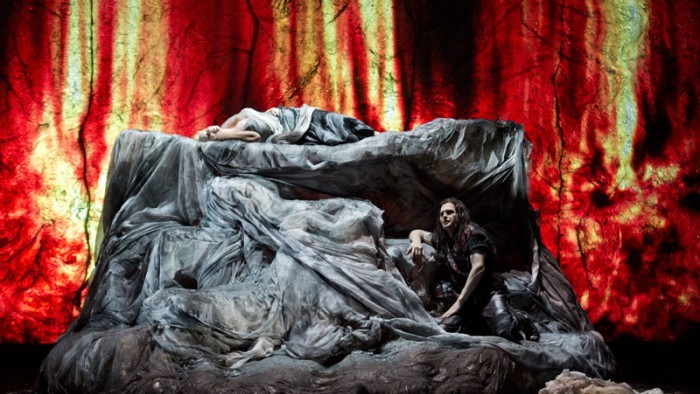 Germany Wagner, Siegfried: Staatskapelle Berlin, Daniel Barenboim (conductor), Schiller Theatre, Berlin, 15.6.2016. (JMI)
Germany Wagner, Siegfried: Staatskapelle Berlin, Daniel Barenboim (conductor), Schiller Theatre, Berlin, 15.6.2016. (JMI)

Production:
Direction: Guy Cassiers
Sets: Guy Cassiers and Enrico Bagnoli
Costumes: Tim Van Steenbergen
Lighting: Enrico Bagnoli
Cast:
Siegfried: Andreas Schager
Brünnhilde: Irene Theorin
Wanderer: Iain Paterson
Mime: Stephan Rügamer
Alberich: Jochen Schmeckenbecher
Fafner: Falk Struckmann
Erda: Anna Larsson
Forest Bird: Christina Gansch
Berlin’s Wagner Tetralogy continues to offer superb music, complemented on this occasion by the spectacular voice of the protagonist.
Daniel Barenboim has again provided a bright reading of Wagner. The best moments were the spectacular start of Act III, where he drew an impressive sound from the Staatskapelle Berlin; and the scene of Brünnhilde’s Rock, with a most inspired conducting. Act I was almost at the same level, but in Act II Barenboim returned to slow tempi, and the result was not as convincing. It isn’t easy to maintain a consistent level of excellence throughout the four hours of Siegfried, but overall Barenboim gave us a great version of the opera.
The stage production by Guy Cassiers employs a large number of video projections. In the first act, the images show a profusion of birds and numerous swords. In Act II, there are a few trees and a dragon that is really more suggested than seen, while the desolate landscape of Act III suits the Rock of Brünnhilde. The sets consist mainly of props: some cases for the first act, fake trees for the second and a kind of mausoleum for the final scene, which is the best one in the production. In the second act, Mr. Cassiers once again incorporates dancers with swords, and a young woman representing the Forest Bird. The Erda scene lacks mystery, and the forging of Nothung has to be imagined since we do not witness it.
Austrian tenor Andreas Schager was a truly spectacular Siegfried. His powerful voice ran easily through the house, overcoming any orchestral obstacle from the pit. When I heard Schager singing in the first act, I wondered if he would be able to reach the end of the opera, and he did, without a single failure. He is a real force of nature: his sound is not particularly beautiful, but one is impressed by the display of power. Since Schager’s singing is almost always based on strength, I do wonder how long it can last, but today he easily competes as the reference for Siegfried, together with Stephen Gould (a more beautiful voice) and Stefan Vinke (a less attractive voice).
Brünnhilde was again Swedish soprano Irene Theorin, who gave a convincing performance with, at times, the best singing of the entire opera. Her shouted top notes hurt my ears, but apparently not those of the audience.
Iain Paterson repeated the role of Wotan, now as the Wanderer, and again fell rather short at the low notes. To my taste, this was his best singing so far in the cycle.
Stephan Rügamer has gone from Loge in Rheingold to Mime in Siegfried. He is better in vocal terms than most of his colleagues in this character, but he falls short on stage when compared with some Mimes.
Jochen Schmeckenbecher was again convincing as Alberich, but Anna Larsson had problems at the bottom of the range as Erda. Falk Struckmann was serviceable as Fafner. Finally, the Forest Bird was sung by soprano Christina Gansch, whose voice seemed to me somewhat immature.
José M. Irurzun
